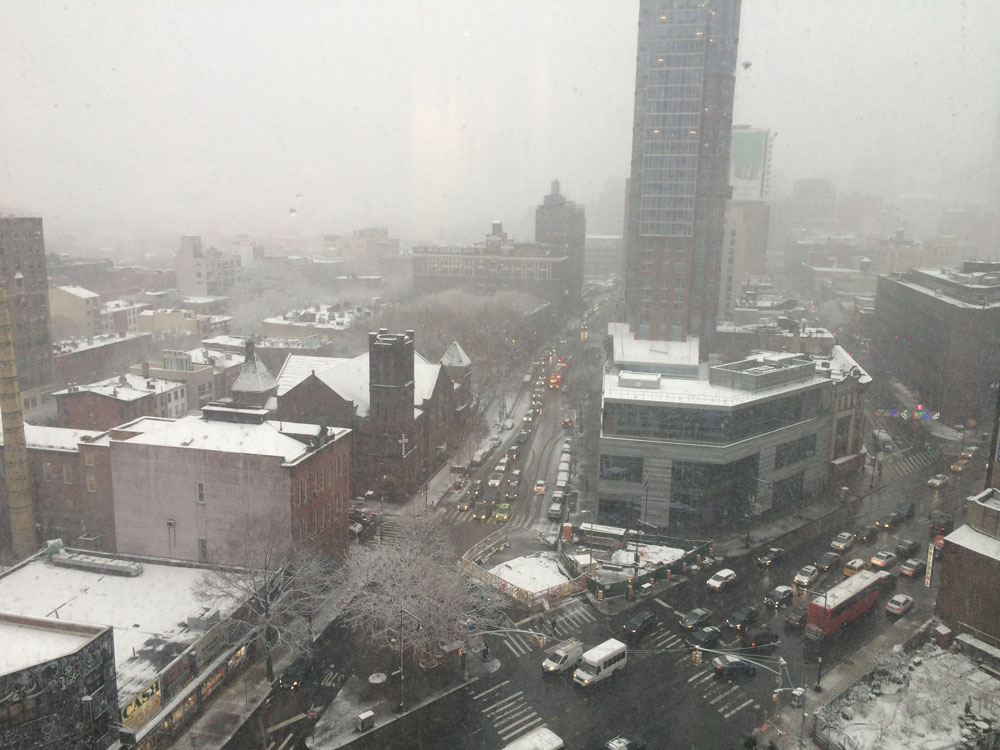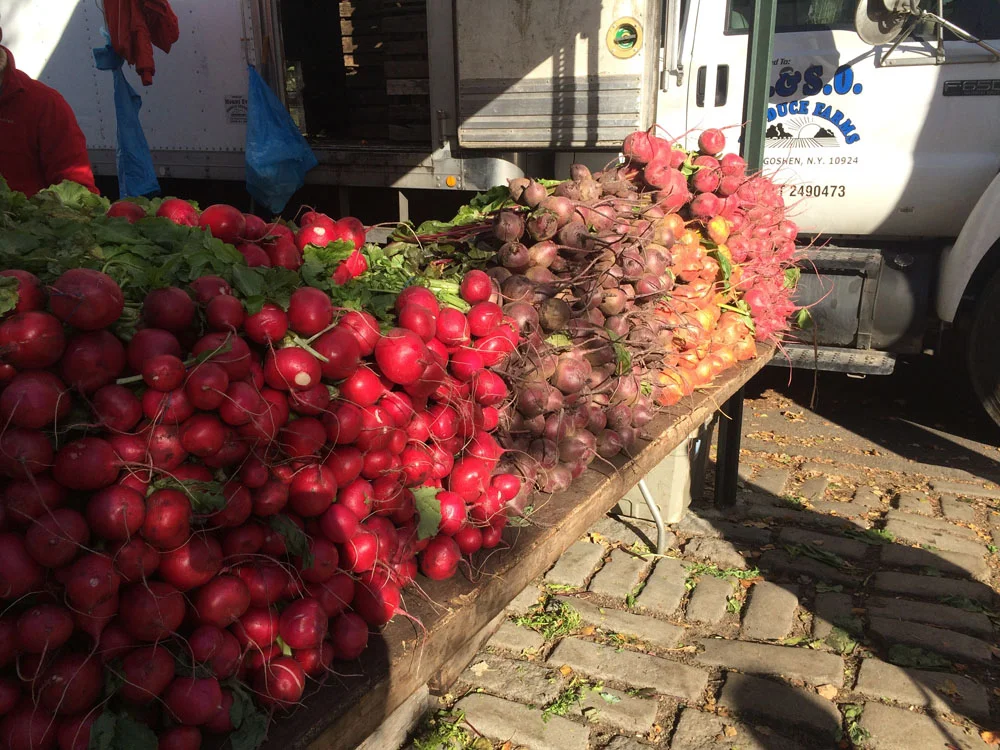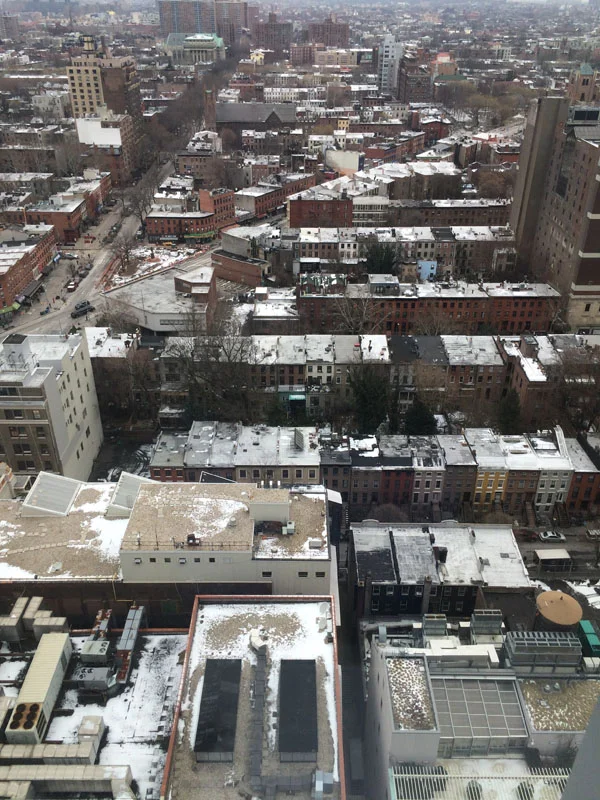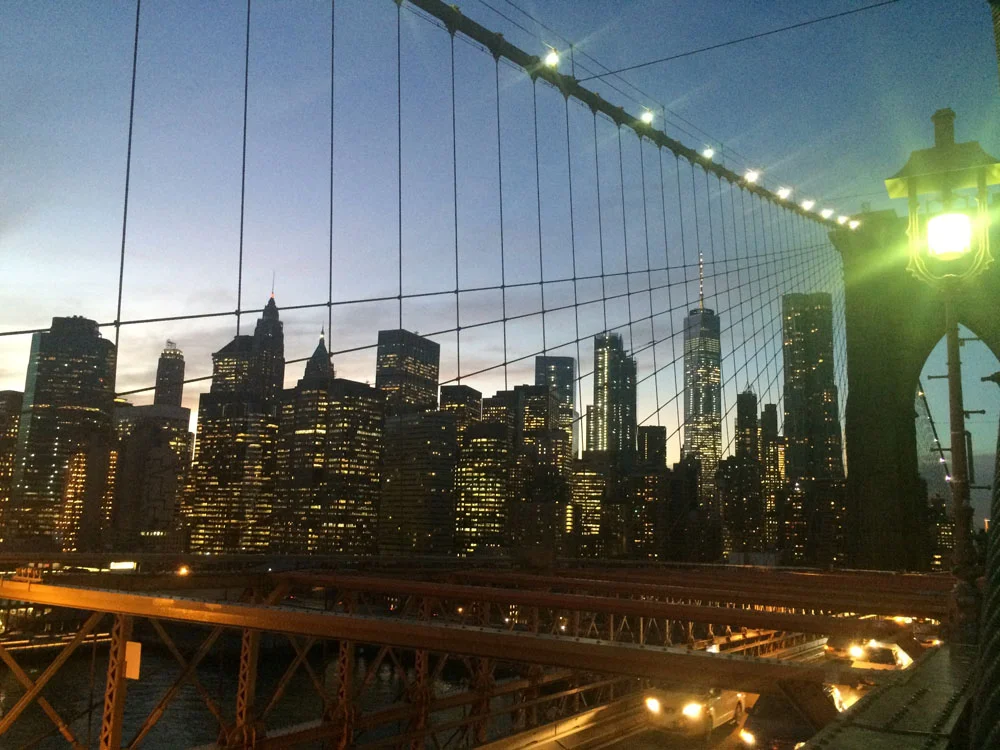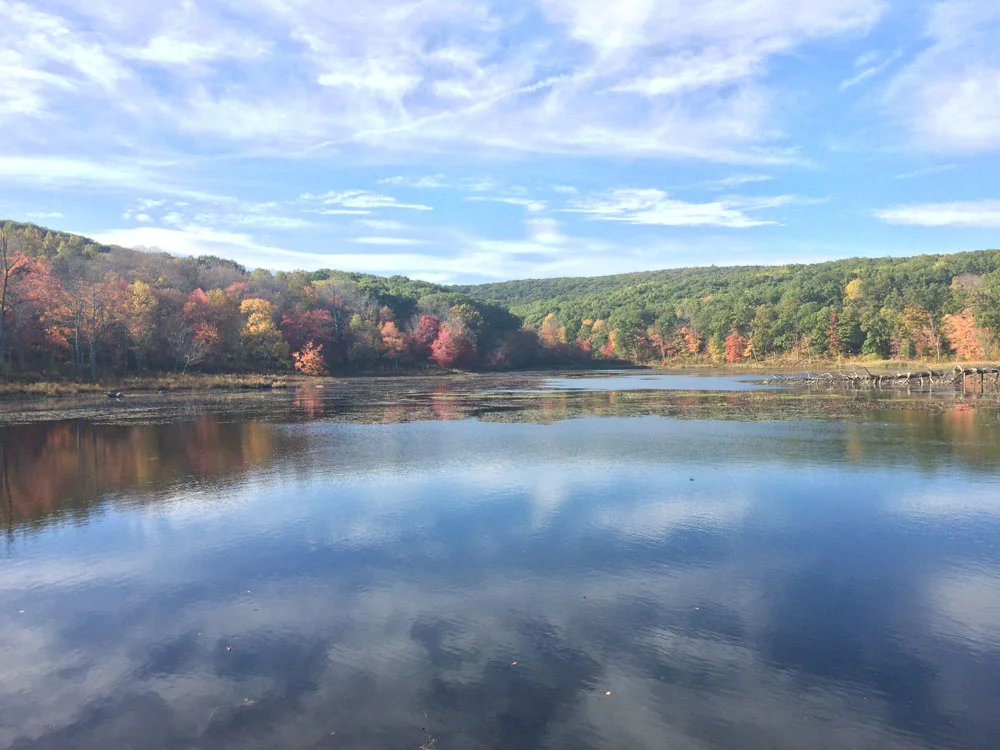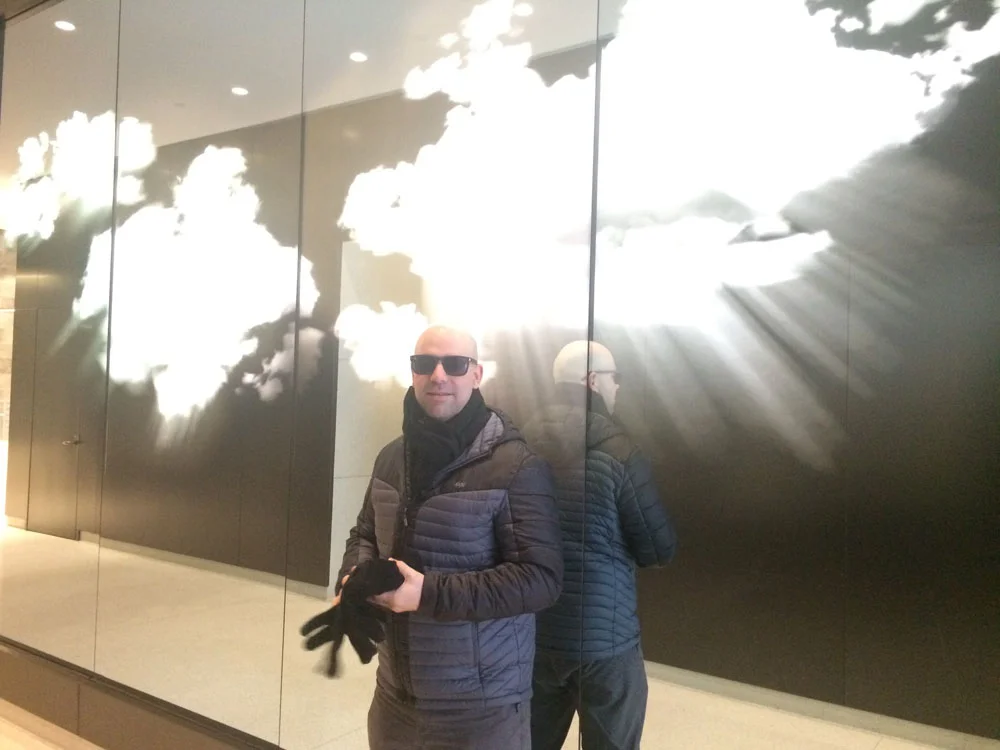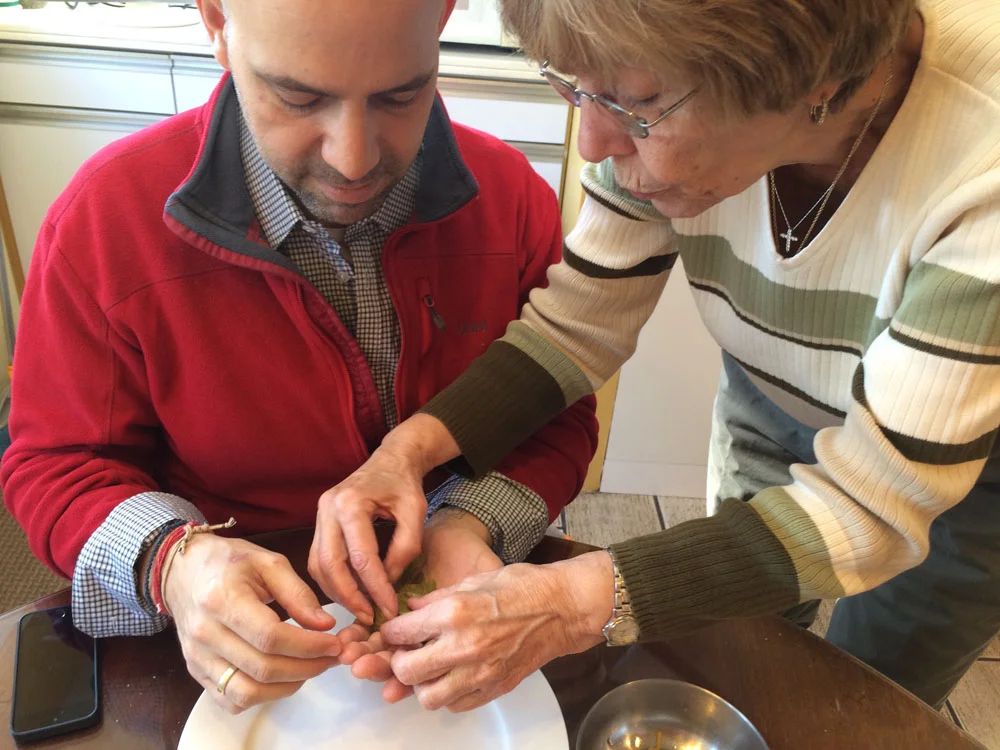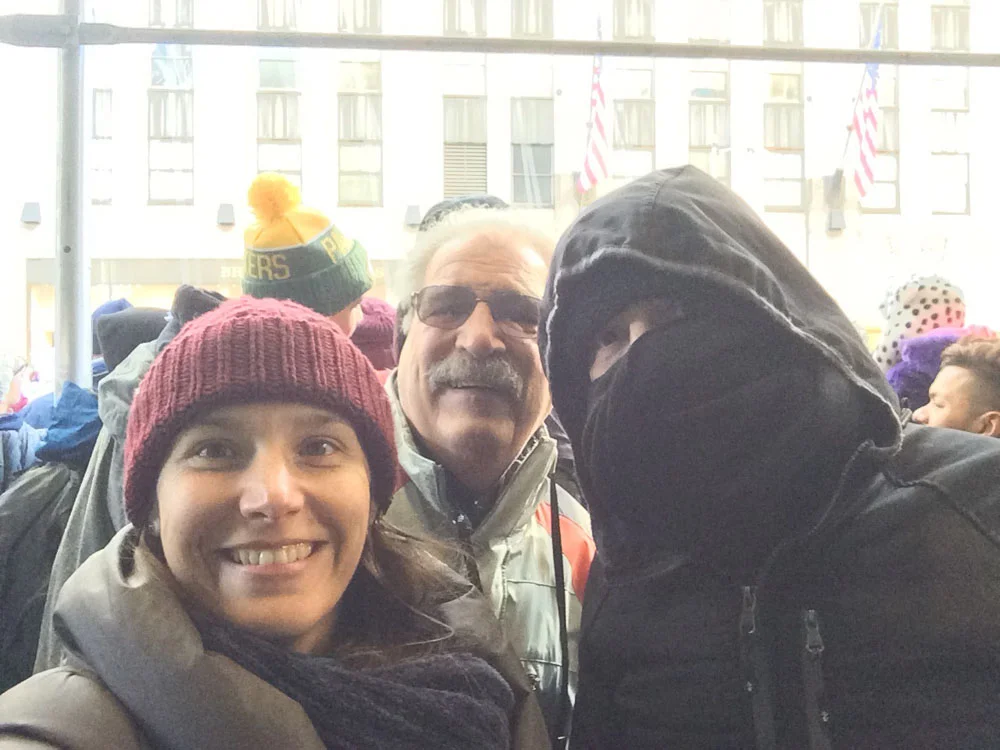New York City

EAT Dekalb Market and Junior's
OUT Walter's
Fort Greene in the snow
New York state of mind
The building where we stayed while in Brooklyn
christina
I was born in Queens and raised right outside of NYC in the suburbs, so close in fact, that you can see my hometown on the NYC subway map (just outside the border of Queens). Coming "home" to this great city has always been a layered experience for me - I have a deep love for it and a critique of it at the same time. Over time these polarizing feelings have only increased, and after this last trip I'm left really considering the difference between surviving and thriving in this world.
Growing up so close to the city in the 80s and 90s, I benefited from a childhood and teen years that had me orbiting and participating in the wonderment of all NYC had to offer. It was incredible - I was exposed to an unparalleled cultural diversity, an amazing artistic and music culture, the underground rave scene of the 90s, and generally a feeling of independence as I roamed the dense streets only 30 minutes away by train from the suburban bubble.
Being part of a huge Greek immigrant family, I spent time almost every week in either Queens or Washington Heights where I had family events. I have great memories of visiting my cousins and grandparents and playing handball and Ringolevio on city blocks while waiting for Mister Softee to come through. I also remember the strange juxtaposition of heading back to the suburbs where things were less exciting but more "safe." Jumping between these 2 worlds of city and suburban life, I was from a young age deeply questioning the ideas of wealth and society.
During my college years, I would spend my summers living at home on Long Island and heading into the city, Astoria or Brooklyn almost every night to go out. My friends who had stayed in NY for school were living downtown or in warehouses in Bushwick - some of the first artists to settle into those industrial areas. After I graduated, I finally got to live in NYC proper from 2000-2001 on 45th street and 9th Avenue. At the time, the Hell's Kitchen neighborhood hadn't totally changed yet; there were sex workers on the corner and when I walked home in the early hours of morning by myself I kept my head down and did my best to stay alert. It wasn't dangerous but it was gritty, and at 22, I loved that feeling.
I really loved NYC, everything about it to me was the example of what the world was - full of opportunity, diverse, multicultural and electric, all the world's people speaking in different languages, eating different foods, making music of all kinds. The dream of this reality, where everyone lived harmoniously side-by-side and rode the same trains (the great equalizer), was perhaps a bit idealistic but it was how I saw it. If you ask anyone that has ever lived there why they love this city, these are the things that they too will point out.
After leaving NY for California in 2001, I began a 15-year bi-coastal journey of bouncing between living in both places for years at a time. Each time I came back to NY, I would think about the contrast it provided with California. Where California was spacious and spread out horizontally, NY was dense and vertical. Where NYer's attitudes were edgy, quick, sarcastic and sharp, Californians were mellow, relaxed, spacey and more kind (sarcasm, as I would learn, was not acceptable). The stereotypes seemed to fit but it's much more than that.
What I came to realize over time is that NYC is defined by the immigrant experience of survival within limited resources, whereas California and the West Coast historically draw from Manifest Destiny and Westward Expansion and have evolved a totally different cultural ethos of "thriving to improve" within an abundance of space and resources. When you ask a New Yorker how they are, they will typically respond with a variation of, "Nothing much to complain about," an indicator and reference to survival. A Californian will never frame their response this way and will typically answer the question with much more vulnerability and detail.
I was hit with this juxtaposition of survive or thrive mentality once again as we decided to stay in NY for a few months. Perhaps it's my expanded frame of reference from all this travel but I think the city's ongoing poverty rate of 20% along with the hyper-gentrification and all it's brought with it has contributed. We were to see all of it first hand in Fort Greene, Brooklyn where a friend let us stay in a brand new building at the intersection of Lafayette and Flatbush.
Known historically as an African-American bohemian neighborhood and as a cultural destination with BAM, Fort Greene is at the forefront of the debate on gentrification as director Spike Lee has pointed out. There has been much discussed on this neighborhood's changes and it has even been the subject of an academic study on gentrification. Spending time there, especially in this building with a doorman, a Mac store and a Whole Foods spin-off, sent my NYer head spinning on everything this city has become and how it has out-priced itself and it's DNA of diversity. It also had me deeply questioning the ability of people in the city to thrive when really all they can do is engage with survival - especially with regards to rents and housing. Perhaps this issue has become the great equalizer for working people, along with the subway?
Gentrification is a global issue, not one limited to NYC and it's happening in California too. There are many theories about why it happens and historians point out that it's been happening since the times of ancient Rome where large villas were replacing small shops. Characterized by changing demographics and rising real estate prices, some point to the benefits of gentrification (i.e. urban revialization) while others point out the inconsistencies. What can't be denied, in my opinion, is the impact on a neighborhood's people.
In the context of NYC, I've seen this not just in Brooklyn but also in Astoria where I spent my childhood and where my Greek-American immigrant community has been centered. The apartments where my family, my grandparents, aunts, uncles and cousins, still live are barely affordable to rent with hipsters moving in and driving the prices up. People I know from Manhattan and Long Island are telling me about how great Astoria is, as if I've never heard of this utopic place right across the bridge where I was born. When I see my family members at events they have mixed feelings on the matter - sure they like the new coffee shops and restaurants but they know they are on the verge of being priced out - just like what's happened throughout Brooklyn.
Coming back home to NYC this time has made me realize that as the city has gotten more "desirable," I want to be there even less. Of course there is still a diverse, vibrant city at work but more and more people have been forced into survival mentality and the dynamic beauty that was once there has suffered. What does this tell us about city living in general and more importantly how our American system doesn't work for our own creativity but rather only for capitalist gains. How do we fix this?
Friends who have stayed in NYC either were able to buy early or are living in rent-controlled apartments. The ones paying full market value rent are in a dual-income household and grossly overworked to pay the rent; if they have kids they are in some sort of daycare that also costs a fortune. Many people I know have left for the West Coast or upstate. Is this what has become of the American dream in the idealistic vision of melting-pot NYC? The work work work attitude has triumphed over all due to the hyper-gentrification of the entire city driven by money.
The NYC of my youth, which included a thriving art scene and a range of demographics, seems to be gone. I'm not the first to say this and I know there are people hard at work to fix this but it feels like the whole city has become a playground for the rich. What's left are a chain of Starbuck's, an aging subway infrastructure and friends still defending the city's viability, reminding me how diversity is the reason they live there. The issue though is that these friends and family can still afford access. The vibe I get from those who can't is a very different NY story.
As someone who runs my own business, I find myself stunned by the rents in the neighborhood I was born in and the ones my parents grew up in (forget about Brooklyn!). The NYC work culture is completely absorbed by these basic housing needs. If I wanted to return to NYC and live near my family I would have to sacrifice the work-life balance I've worked hard to get to and buy in completely to this survival mentality. I'm not willing to do it personally; I don't think it's healthy, sustainable or holistic.
I wonder how much happier everyone would be here if they could give themselves the gift of thriving creatively instead of just surviving (in other words, working hard to pay those rents). Leaving NYC years ago, I gave myself this space to truly realize the difference between the two. Traveling and working throughout the world, I have seen other cities where a balance is still possible and encouraged. Can NYC evolve into a newer version of itself that sustains it's creative heartbeat? What will it take to shift NYC's core away from money-driven greed (and really survival) into a sustainable healthy version of itself?
I still believe it is possible; the dream of a diverse vibrant NYC lives within me. I love this city and hope for it; I defend it as much as I criticize it, that's what makes me a true New Yorker I guess...
JULIO
Although we both felt our travels were not complete, Christina’s father’s 70th birthday and a family wedding brought our trip to a halt and had us returning to a much different America than the one we left. The Trumpers were celebrating, citizens were protesting in the streets and there was a heightened sense of displeasure permeating all over. It was a delight to see familiar faces and we jumped right into a seven-day birthday family road trip that covered the Rock and Roll Hall of Fame in Cleveland, Frank Lloyd Wright’s Falling Water, Gettsyburg, Hershey Pennsylvania and Amish Country. We went from being international travelers to something that resembled National Lampoon's Vacation. All kidding aside, it was nice to celebrate and be with family and see some of the eastern US, which is beautiful, and as Americans we certainly take for granted.
Excited to have some time to catch up with friends in the city and Brooklyn, we looked for a place to hang our hats and find some semblance of routine to see if New York life was for us. We luckily found a semi-affordable and beautiful condo in Fort Greene and settled in for two months of NOT traveling. The internet was fast, any kind of food was available for a price and for about a week the city seemed our oyster.
On the edge of a traditionally African-American and Latino neighborhood, the wave of Brooklyn gentrification and its effect on a once minority area could be felt as we passed Bodegas that led to super hipster food courts and newly opened Mac stores. We were so pleased to be able to prepare food, go to the gym, unpack our bags and temporarily settle we had forgotten what it was like to have routine. This feeling was so nice but the difference of life abroad and life in the city became glaringly apparent in many ways. Food, transportation, people's dispositions, and the cost of living was kind of a shock, and was in sharp contrast to so many of our Brooklynite friends telling us this was the greatest place in the world. I just wasn't feeling it, or willing to pay through the nose to participate or evangelize for it. Great place to visit, not so sure I could live there long-term without the stellar job that means everything to you and forces you to buy into the dream.
We arrived in early November and stayed through early January giving us plenty of family time and the chance to experience the city during the holidays, which was pretty incredible. Store windows are decorated, people are less rude and holiday songs are playing from block to block. It was shocking how "American" it all felt. From the droves of shoppers, the Macy's Thanksgiving Day Parade to the never-ending table conversations on politics, I was feeling less and less able to exist peacefully in my home environment.
The view from the 11th floor
SNOW!
Shoveling snow in Long Island at the Glavas family home
The family that shovels together, stays together
Beautiful public transportation
the NYC subway tunnel
Time's Square
Grand Central Station
Picnic on the family road trip
Frank Lloyd Wright's Falling Water in PA
alking across the BK bridge at sunset
the Statue of Liberty was visible from our apartment
Fresh Baked Apples a la mode
Unwinding with friends in Sharon, CT
The famous Katz's Deli and a real NYC Reuben
We went and saw the Chihuly exhibit at the Brooklyn Botanical Gardenn
Decorating the tree with Mrs. Glavas
The lobby of 300 Asland in BK
Learning to fold Grape leaves properly from Mrs.Glavas
A family day at the Met
We went to the Macy's parade and it was cold!
FOOD FACTS: Over the past decade, Brooklyn has emerged as the epicenter of the craft food and drinks movement of NYC. In contrast, Brooklyn has the highest rate of food insecurity of any borough, at 18.8% of the population experiencing meal gaps on daily basis.








